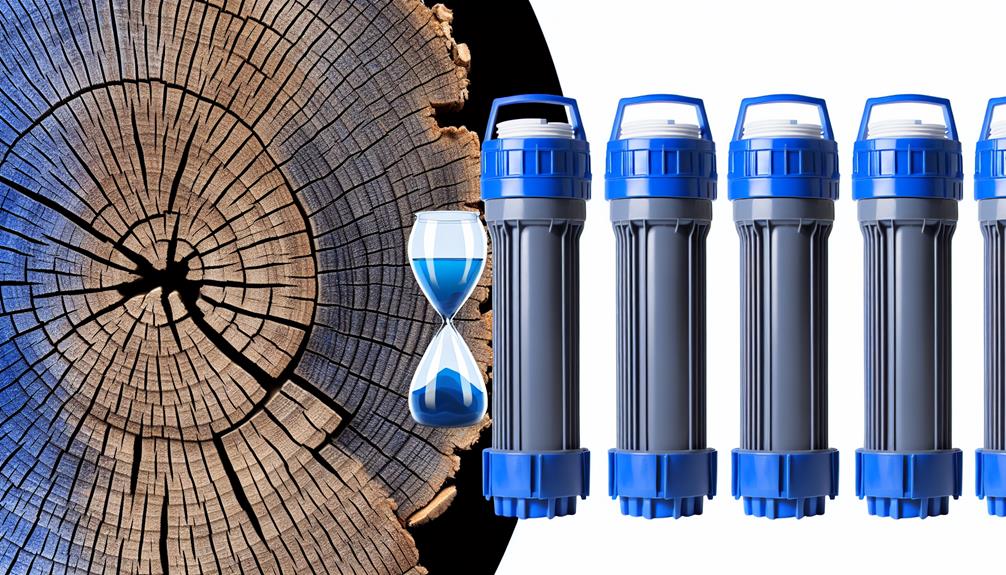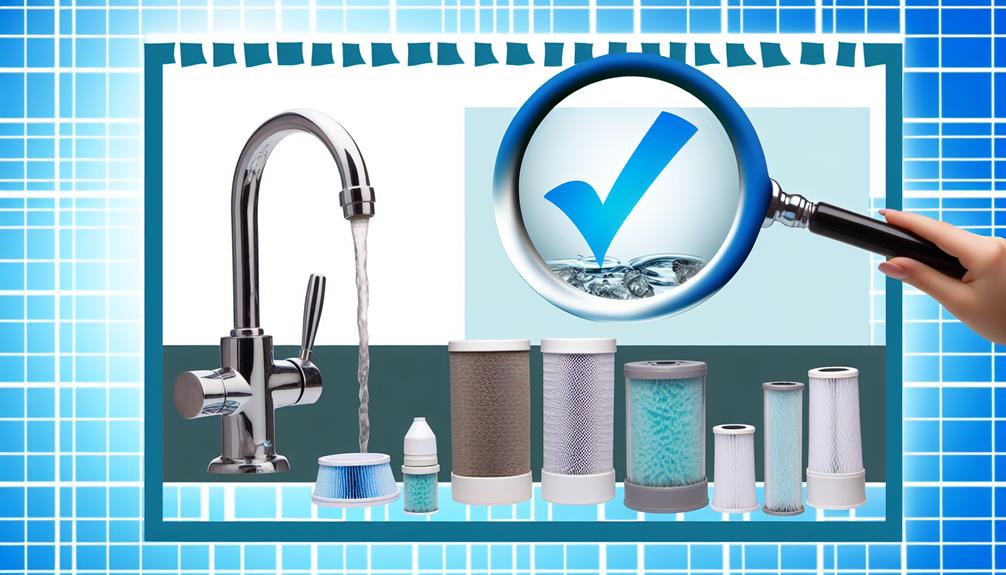Imagine a steady stream of crystal-clear water cascading from your faucet, a testament to the silent guardian in your plumbing: the water filter.
You rely on it daily to remove impurities and ensure the water you drink is clean and safe, but like all things, it has a lifespan.
The good news is, with a few savvy strategies, you can significantly prolong the life of your water filter. You'll need to get your hands wet—figuratively speaking—with regular maintenance and a bit of know-how on when to replace components before they falter.
Beyond the basics, there are some less obvious tips that can help you maintain both water quality and filter longevity.
Stick around, and you'll discover how a little attention can go a long way in keeping your water pristine and your filter functioning efficiently for years to come.
Understanding Filter Capacity
To ensure optimal performance from your water filtration system, it's crucial to regularly monitor and understand its filter capacity, which dictates the volume of water that can be purified before maintenance is necessary. Grasping this concept not only guarantees the longevity of your device but also the purity of your water.
Filter capacity is typically quantified in gallons or months, indicating how much water can pass through before the filters' efficacy diminishes. It's essential to refer to the manufacturer's specifications to ascertain the precise capacity of your filters. Failing to replace the filters within the recommended timeframe can lead to a decline in water quality and potentially damage your system, shortening the lifespan of your water filtration setup.
Bear in mind that different filters come with various capacities – a fact that underscores the importance of a tailored approach to maintenance. It's a detail-oriented process that requires vigilance; you'll need to track usage and anticipate when a filter will reach its capacity.
Regular Filter Replacement
Maintaining your water filtration system's performance necessitates regular replacement of filters to prevent the accumulation of impurities and contaminants. The filters need to be changed at least every six months or according to the specific timetable set forth by the manufacturer. This is essential to uphold the system's ability to effectively remove sediment, chlorine, and heavy metals from your water.
Regular cleaning between replacements can help maintain the filter's efficacy, but it doesn't substitute for a full replacement. As filters trap more particles over time, their efficiency in purifying water diminishes. The regular replacement schedule ensures that your system operates at optimal levels, providing you with clean and safe water consistently.
Monitoring the life span of your filters is a critical aspect of your water filtration system's maintenance. Adherence to the recommended replacement schedule is necessary to ensure that the system's efficiency remains uncompromised. Neglecting to replace filters can result in poor water quality and might lead to more significant issues with your system down the line.
Therefore, make a note of the installation date and set reminders for when your next filter change is due to maintain the best possible water quality.
Cleaning and Maintenance
While regular filter replacement is crucial for your system's efficiency, complementing this with thorough cleaning and maintenance can significantly extend the lifespan of your water filters. It's imperative that you clean your water filtration system components, such as filter cartridges, housing, and tubing, to prevent the accumulation of minerals, dirt, and contaminants that can lead to clogged filters.
Utilize gentle cleaning products and warm water for maintenance to avoid compromising the integrity of the system components. Be vigilant and monitor signs that may indicate the need for cleaning, like a slow water flow, an unusual taste, or visible dirt accumulation. These symptoms suggest that contaminants are impeding your filter's performance.
Proper storage of the filtration system is also key. Protect it from freezing temperatures and allow the filter to dry naturally in a warm, well-ventilated area. Handle filters with care to prevent any damage that might affect their functionality.
Lastly, don't hesitate to consult a water filtration professional for routine check-ups and cleanings. They can provide expert advice on filter replacement and ensure the efficient and safe functioning of your system.
Monitoring Water Quality
Regular testing of your water quality is essential to verify that the safety standards are consistently met. To extend your water filter's lifespan and ensure the quality of the water you consume, you must be vigilant in monitoring water quality. This means looking out for signs of impurities like an unusual taste, smell, or visible particles. These indicators can suggest that your filter is either not working properly or is approaching the end of its useful life.
Furthermore, you should conduct water quality tests periodically using a water testing kit. These kits can reveal the presence of contaminants such as bacteria, lead, and other harmful substances that may not be detected through sensory examination alone. If you're not confident in performing these tests yourself, consult a professional to monitor your water and provide a comprehensive analysis.
Staying informed about local water quality reports and advisories is also critical. These can alert you to any environmental changes or infrastructure issues that might affect the water supply. By integrating these practices into your routine, you can take proactive steps to maintain your water filter and safeguard your household's water quality.
Professional Inspections and Servicing
Enlist certified technicians for periodic inspections and servicing of your water filtration system to ensure its peak performance and longevity. Adhering to the manufacturer's instructions, these professionals delve into the system's components with a fine-tooth comb. They're trained to spot subtle signs of wear or malfunction that you might miss.
During professional inspections and servicing, technicians scrutinize your system's filtration capacity and verify the efficient removal of contaminants and impurities. This level of detailed examination is analytical—considering flow rates, filter integrity, and potential clogging issues that could compromise water quality or damage your system.
Routine check-ups by experts can preempt major problems. It's not just about prolonging the life of your water filtration system; it's also about maintaining the safety and health benefits of the clean drinking water it provides. Remember, early detection through professional servicing can mean the difference between a simple fix and a costly replacement.
If you're uncertain about the state of your system or it's time for a routine service, don't hesitate to contact Atlantic Blue Water Center at (410) 751-9200. They can assist with system issues and help schedule your next inspection and cleaning, ensuring your water remains pure and your system operates flawlessly.

